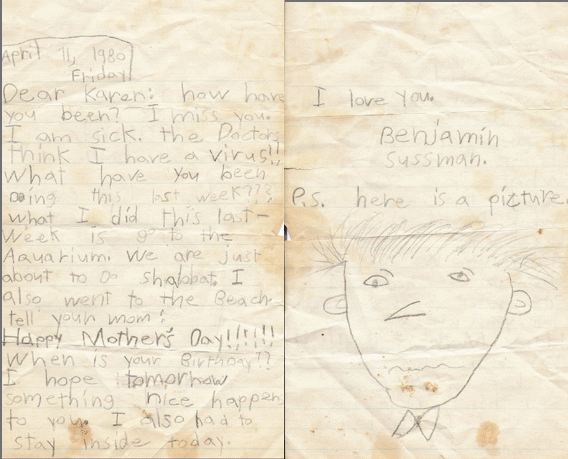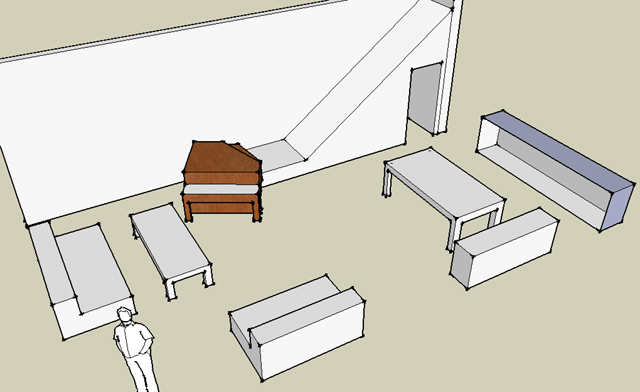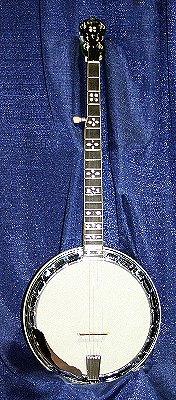By the way, my co-worker Fitz and I are going to collaboratively present two talks at the O’Reilly Open Source Convention this coming July. I’m quite excited… I’ve never been to OSCON before, nor have I been to Portland. Click on the logo below for more info about OSCON.
iBanjo
pickin', grinnin', and pushin' bits
Ah, young love
This was recently sent to me by a girlfriend from way back. I mean, waaaaaaaaaaay back.

Immigration March
My coworker and friend Jon Trowbridge has become quite the photojournalist lately, often bringing his cool digital SLR camera to work, taking photography classes, and becoming the master of Photoshop. On Monday, when immigrants staged protests across the U.S., he dragged me out of the Google Chicago office to experience firsthand what would be described as the largest of all the protests — about 400,000 people! It was truly amazing, being swept up in the crowds and sea of heads. At some point I ended up with a sign too, and Jon was there to take the photo.


Sketching my living room
Things have been busy. Lots of travel for Google and family. Six flights in two weeks is too much.
The baby, at six months, has decided to start crawling. This coincides with his first two teeth. So now he crawls around the house, gnawing on chair legs when we’re not looking; I think he may be secretly building a dam. And today he learned to pull himself up onto low surfaces, standing and balancing precariously on coffee tables, couches, and steps. Now we have to catch him every time he falls over, as he tries to furniture-surf. I think this sort of behavior is a bit… early… for only six months old!
The new banjo is great too. After practicing on it for a couple of weeks, it’s hard to go back to the old banjo. The new banjo allows a lot more control, more subtlety of tone and dynamics. I took a one-day master class with Greg Cahill (a well-known bluegrass player) and came away with a whole bunch of tablature-ified licks to practice. And last night, my Friday Night Jam group actually played in public at a coffee house. Lots of people came and went, it was great fun. However, we tend to overplay in public. If I can’t hear my own banjo, then you know everyone is playing way too loud!
The fun project of the weekend is preparing to receive a baby grand piano. Mom is moving into a smaller house, and I’m inheriting the Steinway 1935 baby grand. The question is, how the heck are we gonna fit this thing into our living room?
Luckily, Google just released a new free product called Sketchup. It’s really amazing. It’s sort of like a point-and-click paint program that allows you to create 3D models, and the user interface is really dead simple to use. After a 15 minute tutorial, it took me about an hour and a half to recreate our living room. We could then spin furniture around, orbit the camera around the room, and find a place for the piano:

Really, you gotta try this program. Go download it and play around! Of course, my wife laughed at my insistence on using this program. In about half the time, she took out our actual house floor plans and made little paper cut-outs of our furniture. By the time I finished the 3D model, she had long figured out where to put the piano already, and was off working on other chores. Hmph.
This one goes to 11.

Road trip to Nashville is complete!
Visited a few stores, and even got a private tour of a small banjo factory. Dragged my friends, wife, and baby with me, and most of the time they seemed to enjoy themselves. The final trip was to the farmhouse of a semi-famous banjo player and master craftsman, Paul Hopkins. He builds banjos one at a time with his son, and has over 30 years of experience in the business.
Like many independent banjo builders, he owns a couple of pre-WWII Gibson banjos, which are considered by most banjoists to be the Holy Grail of banjos. Paul, in fact, has inherited the actual 1934 Gibson that Earl Scruggs plays in the opening track (“Ground Speed”) of the uber-famous Foggy Mountain Banjo album. And of course, he even played that tune for me on said banjo. 🙂
So, as you might expect, Paul and others have spent years trying to build new banjos that imitate that magic pre-war banjo sound. They model the neck and resonator, and then pour in their own tricks. Folks like Tony Pass, out in Arknasas, have figured out super-secret ways of squeezing together a 3-ply block-rims out of submerged mega-dense wood. Each banjo takes days to hand-carve and assemble in these shops, and let me tell you, you get what you pay for! Here you can see Paul, Tony, and former collaborator Mike (R.I.P) sitting in Paul’s sound studio, the very place where I got try out the completed banjos.
And so I finally found The One, made of glistening walnut and chrome. There’s really no way to describe the sound of this thing. It makes my $300 banjo sound like a toy. It has a ring that is smooth and beautiful when played softly, yet knocks down walls when I start picking harder. I need to actually be careful when I play this thing, I’m not used to the giant bolts of electricity shooting out of it. I fear its power, and expect it will take me years to learn to control it. I suppose the only thing to do is lay down a track or two and post a recording for all to hear!
Sure, I could have driven to central Michigan and bought the same banjo from a store, but it’s just incredible to see the exact tools, benches, and pieces of hardware whence your instrument was born. It’s even better to know the craftsman personally. If something goes amiss with the banjo, I can phone Paul and ask for advice, or just ship it out to him for servicing. He wants to take care of his “babies”, you could say. That’s the sort of attention you just can’t find at a retail store!
This is the banjo for the Rest of My Life, well worth the two years of research and savings. It’s the banjo to pass down to my heirs. And holy moly, does it inspire me to practice!
(P.S. If you haven’t clicked the links above, do so. There are some nice photos.)
Video crack
So here I am, 33 years old, and I’ve never had cable TV before.
Until now.
Not sure why we finally ordered it, but my wife and I were just sick of fuzzy-blurry reception on our TV channels. We were tired of adjusting the rabbit ears every time we changed the channel. And we dreamed of HGTV and Food network.
So, we got satellite TV installed, which also happened to come along with a DVR. Now I can not only pause and rewind live TV, the thing will record programs for me automatically. And there are so, so, so many channels to surf. I can’t stop flipping channels. It’s all so… overwhelming.
Hopefully the addiction will wear off soon. Friends say that after a week or two, I’ll only be watching a handful of shows that the DVR captures for me.
Pillars of code
So a lot of people have heard about how Google engineers get a couple of 24″ flatpanels attached to their machines. But a co-worker turned me on to the idea of rotating them vertically. It’s amazing that the X.org server can do that!

(photo by Jon Trowbridge)
I mean, man, look at the length of that Emacs! I can see entire files now without scrolling!
Did he win?
Dad had a lot of stuff. I mean, a lot of stuff.
Mom has been busy trying to clean out 30 years of accumulated objects, and the sheer quantity of things that dad “collected” is overwhelming. I guess the best way to describe it is that he collected collections!
What’s on my mind is: what does all this stuff say about somebody? What made this person tick?
- At least 25 different kinds of collector’s pocket-knives
- Ten very fancy pairs of binoculars
- Eight shortwave radios, spanning 1980 to the present
- More than ten different types of walkmen and portable CD
players - More than ten different types of fancy headphones
- A huge coin collection
- At least 25 nearly-mint overcoats and fancy outdoor jackets
- At least 25 nearly-mint luxury sweaters
- At least 25 perfectly-cared-for pairs of shoes and boots
- More than 50 J. Peterman catalogs
At first glance, my thoughts were, “why so much stuff? Is there any point?” But I’m starting to see a pattern to all of this. I wonder if it all plays into some sort of fantasy he had, maybe something from his childhood. He used to talk about how, as a kid, he wanted to be a cowboy, then later a spaceman. Look at the list of things above: they all play into the idea of adventuring and exploration. Sweaters, coats, and boots of all kinds to brave the elements. Binoculars to spy on the enemy. Pocket knives to survive the wilderness. Radio & communications equipment to signal back to base. And the J. Peterman catalogs… well, let’s just say they’re more like fantasy/adventure novels than clothing catalogs!
All I can say is: thank goodness for ebay.
The ever-slowing banjo
So most everybody’s listened to NPR’s Car Talk, right? I don’t have one whit of interest in automobiles, but their talk show is still immensely entertaining to me. I guess it’s all about the personalities.
If you’ve heard the show, then you probably are familiar with their opening theme song, which is a bluegrass tune mainly played on a banjo. (According to their website, it’s a live recording of a David Grisman tune.) Ever noticed how great a tune it is? It’s just this perfectly smooth stream of eighth notes coming from the banjo, perfect pull-offs and hammer-ons, and the melody just stands out in the cascade of sound.
When I first started listening to Car Talk years ago, I remember thinking, “dang, it must be so hard to play banjo… listen how insanely fast that banjo is going!” The stream of notes where just a blur, and all you could do was just sort of listen, slack-jawed, and wonder how the guy was performing such a feat.
But as I practice my banjo more and more, pick more licks and pick up speed, the magic has gradually dissipated. Over the last year, every time I hear the theme song, the banjo seems to be playing slower and slower. I actually did a double-take this morning when I heard the song. I mean, I can actually visualize what the banjo player is doing. I can hear the exact notes he’s playing, understanding every arpeggio and run and lick. In fact, I’m sure that if I had the recording in front of me, I could transcribe the tab now, and learn to play it myself.
Honest! He’s just not playing as quickly as he used to!
Tuna Jackpot!
Boy does my wife know me. She got me an amazing birthday present… a treasure trove of tuna delicacies!

Just look at that smorgasbord. The list includes:
- Flott Tuna: two types of the legendary Flott brand, one in a jar, one in a can. Now I can compare the two directly and see what sort of difference the packaging makes.
- Ventresca: this is the “underbelly” of the fish, considered a delicacy. Two different brands compete on this front, one labeling itself as containing “tuna breasts” of Bonito del Norte, a type of white tuna.
- Olives stuffed with tuna: two of my favorite foods collide! “You got your tuna in my olive…”
- Salt-cured tuna loin: a slab of expensive ventresca-cut tuna, cured much like bacon. It’s best sliced thinly over toast points, drizzled with olive oil. The best description I can come up with is “tuna prosciutto”, and you can see it served on the plate in the picture.
- Tuna caviar: dried tuna eggs, ready to sprinkle over salads and pasta. Rather amazing.
Oh my. It’s going to be a busy month.
